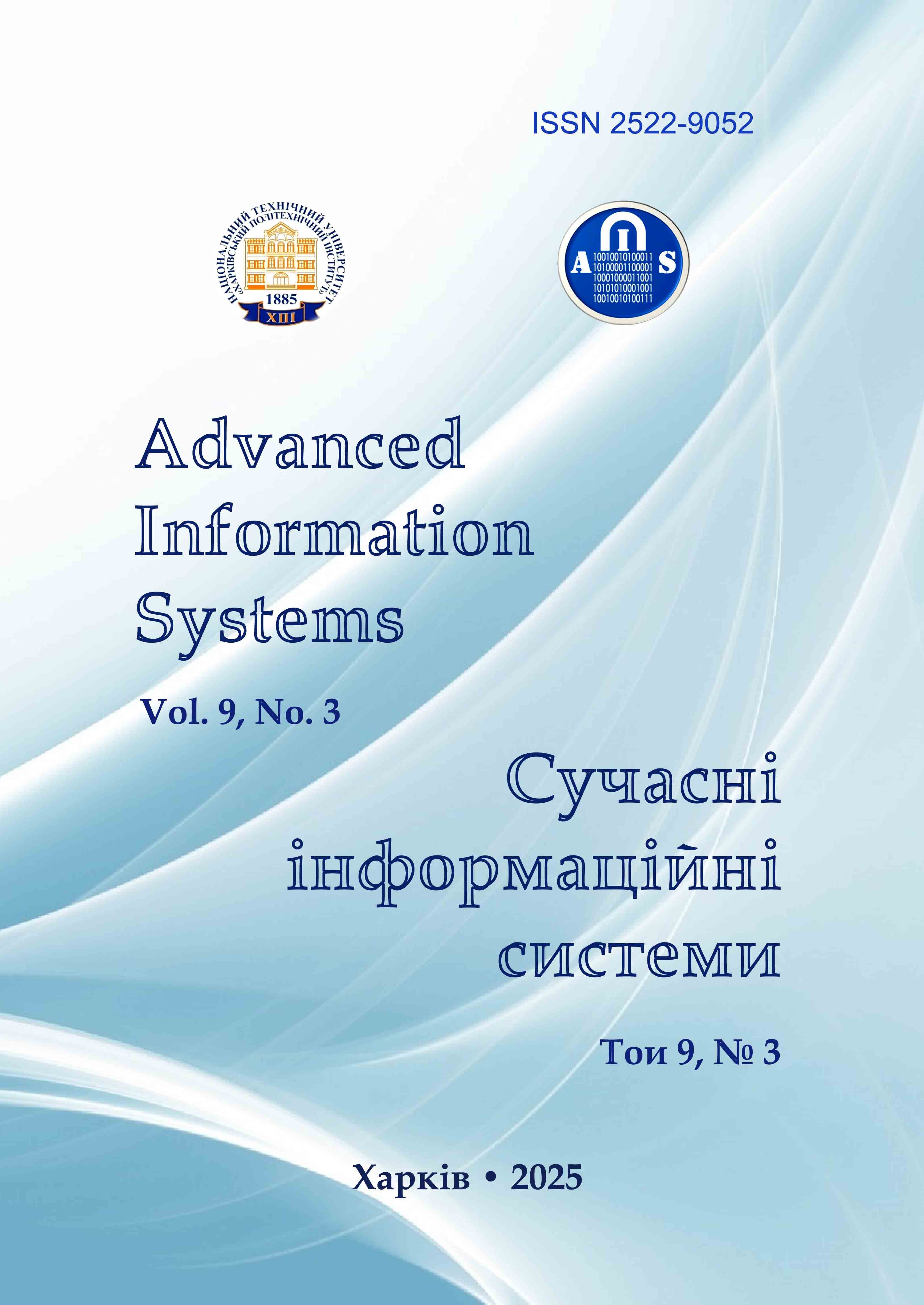DEVELOPMENT OF PROCESSES FOR MONITORING PROGRAM IMPLEMENTATION IN STAKEHOLDER-ORIENTED RESOURCE MANAGEMENT
Main Article Content
Abstract
Accounting for the influence of stakeholders on human resource management processes enhances a program's feasibility and ensures the sustainable development of management processes. The object of this research is the resource management processes within programs. The research subject is the models, methods, and processes of stakeholder-oriented management of program resource provisioning. The study aims to develop a set of models for stakeholder-oriented management of program resource provisioning. The paper addresses the following tasks: to develop a conceptual model of stakeholder-oriented management of program resource provisioning; to develop an aggregated model of stakeholder-oriented management of program resource provisioning; and to simulate the process of stakeholder-oriented formulation of resource requirements for programs. The research methodology is based on applying process-based, project-based, and program-based approaches to management, combinatorial analysis, and a configuration-based approach to solving the problem of resource allocation in a multi-project environment. The results of the study include the development of a set of models for stakeholder-oriented management of program resource provisioning, namely: a conceptual model of stakeholder-oriented management of program resource provisioning; an aggregated model of stakeholder-oriented management of program resource provisioning; and a model of the process for stakeholder-oriented formulation of program resource requirements. The scientific novelty of the proposed results lies in developing a set of models whose application will contribute to advancing resource provisioning management processes in programs. The stakeholder-oriented management of program resource provisioning was modelled. The application of the developed models was considered using a test case. Conclusions: the developed stakeholder-oriented models for managing program resource provisioning enable the formalization of the resource management process while considering the requirements for both project and program team composition. The generation of resource provisioning configurations allows for selecting an option that meets requirements regarding functionality, redundancy, cost, composition, and redistributive capability. For the given example, the cost of implementing configurations was reduced by a factor of 1.06-1.24. The number of resource allocation options within the program ranges from 18 to 46,230, allowing the selection of a configuration that enables resource redistribution among program projects based on a donor–acceptor interaction model without additional resources. A promising direction for future research is developing an information system for managing program resource provisioning.
Article Details
References
Bushuyev, S., Chumachenko, I., Galkin, A., Bushuiev, D. and Dotsenko, N. (2025), “Sustainable Development Projects Implementing in BANI Environment Based on AI Tools”, Sustainability, vol. 17, doi: https://doi.org/10.3390/su17062607
(2021), A Guide to the Project Management Body of Knowledge (PMBOK Guide) Seventh Edition and The Standard for Project Management, doi: https://pmiukraine.org/pmbok7/
Fawad S.S., Rehman, A., Kanwal, F., WangDu, F. and Yang, N. (2021), “Protecting organizational competitiveness from the hazards of knowledge leakage through HRM”, Management Decision, doi: https://doi.org/10.1108/MD-06-2020-0741
Bloodgood, J.M. and Chen, A.N.K. (2022), “Preventing organizational knowledge leakage: the influence of knowledge seekers’ awareness, motivation and capability”, Journal of Knowledge Management, vol. 26, no. 9, pp. 2145-2176, doi: https://doi.org/10.1108/JKM-12-2020-0894
Fruhwirth, M., Pammer-Schindler, V. and Thalmann, S. (2024), “Knowledge Leaks in Data-Driven Business Models? Exploring Different Types of Knowledge Risks and Protection Measures”, Schmalenbach J Bus Res, vol. 76, pp. 357–396, doi: https://doi.org/10.1007/s41471-024-00189-z
Renko, M., Bullough, A. and Saeed, S. (2021), “How do resilience and self-efficacy relate to entrepreneurial intentions in countries with varying degrees of fragility? A six-country study”, Int. Small Bus. J. Res. Entrep., vol. 39, pp. 130–156, doi: https://doi.org/10.1177/0266242620960456
Alnhari1 A. A. and Rureshi R. (2024), “Unified External Stakeholder Engagement and ReRuirements Strategy”, International Journal of Software Engineering & Applications (IJSEA), vol. 15, no. 4, doi: https://doi.org/10.5121/ijsea.2024.15501
Klaus-Rosińska, A. and Iwko, J. (2021), “Stakeholder Management—One of the Clues of Sustainable Project Management—As an Underestimated Factor of Project Success in Small Construction Companies”, Sustainability, vol. 13(17), 9877, doi: https://doi.org/10.3390/su13179877
Dubois, O. and Silvius, G. (2020), “The Relation between Sustainable Project Management and Project Success”, Int. J. Manag. Sustain, vol. 9, pp. 218–238, doi: https://doi.org/10.18488/journal.11.2020.94.218.238
Kramskoi, D., Gliznutsa, M. and Suslikov, S. (2024), “Models of resource distribution and information-analytical tools for implementing international innovative projects by scientific, technical, and international organizations”, Bulletin of the National Technical University "KhPI" (economic Sciences), no. 2, pp. 124–128, doi: https://doi.org/10.20998/2519-4461.2024.2.124
Luo, J., Vanhoucke, M., Coelho, J. and Guo, W. (2022), “An efficient genetic programming approach to design priority rules for resource-constrained project scheduling problem”, Expert Systems with Applications, vol. 198, 116753, doi: https://doi.org/10.1016/j.eswa.2022.116753
Van Eynde, R. and Vanhoucke, M. (2022), “A theoretical framework for instance complexity of the resource-constrained project scheduling problem”, Mathematics of Operations Research, doi: https://doi.org/10.1287/moor.2021.1237
Bredael, D., and Vanhoucke, M. (2023), “Multi-project scheduling: a benchmark analysis of metaheuristic algorithms on various optimisation criteria and due dates”, European Journal of Operational Research, vol. 308(1), pp. 54–75, doi: https://doi.org/10.1016/j.ejor.2022.11.009
Gupta, A., Pachar, N., Jain, A., Govindan, K. and Jha, P.C.(2023), “Resource Reallocation Strategies for Sustainable Efficiency Improvement of Retail Chains”, J. Retail. Consum. Serv., vol. 73, 103309, doi: https://doi.org/10.1016/j.jretconser.2023.103309
Zachko, O., Kovalchuk, O., Kobylkin, D. and Yashchuk, V. (2021), “Information Technologies of HR Management in Safety-Oriented Systems”, Proceedings of the International Scientific and Technical Conference on Computer Sciences and Information Technologies, Lviv, Ukraine, 22–25 September 2021, doi: https://doi.org/10.1109/CSIT52700.2021.9648698
Dotsenko, N., Chumachenko, I., Kraivskyi, B., Railian, M., and Litvinov, A. (2024), “Methodological support for managing of critical competences in agile transformation projects within a multi-project medical environment”, Advanced Information Systems, vol. 8, no. 4, pp. 26–33, doi: https://doi.org/10.20998/2522-9052.2024.4.04
Dotsenko, N., Chumachenko, I., Galkin, A., Kuchuk, H. and Chumachenko D. (2023), “Modeling the Transformation of Configuration Management Processes in a Multi-Project Environment”, Sustainability, vol. 15(19), 14308, doi: https://doi.org/10.3390/su151914308
